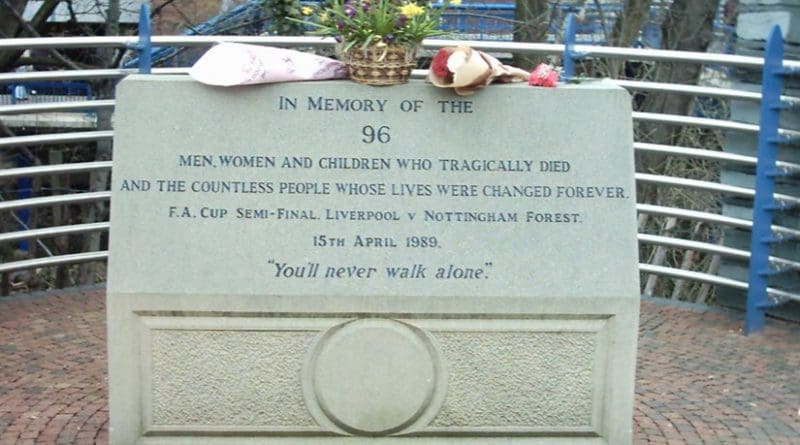Hillsborough: Anatomy Of A Disaster Brought On By A Failure In Public Service – OpEd
By Paul Woodward - War in Context
The 1989 tragedy in which 96 Liverpool fans died while attending a football match in the North of England might to some distant observers sound like a local story of concern primarily to the bereaved and their fellow citizens, but what happened in Sheffield that day speaks to the wider issue of state powers and responsibilities as they are exercised in every democracy.
During an era in which politicians never tire of speaking solemnly about their duty for protecting national security against the threat of terrorism, the task of providing public safety now (as in the past) has much less to do with thwarting foreign and domestic threats, than it does with an ongoing commitment to public service. In turn, serving ordinary people hinges on viewing and treating them with respect.
The victims at Hillsborough were betrayed by authorities (and the media) which placed the protection of their own interests above those they were meant to serve.
The events leading up to the disaster are described in this video:
The Guardian reports: It was a year into these inquests, and 26 years since David Duckenfield, as a South Yorkshire police chief superintendent, took command of the FA Cup semi-final at Hillsborough between Liverpool and Nottingham Forest, that he finally, devastatingly, admitted his serious failures directly caused the deaths of 96 people there.
Duckenfield had arrived at the converted courtroom in Warrington with traces of his former authority, but over seven airless, agonisingly tense days in the witness box last March, he was steadily worn down, surrendering slowly into a crumpled heap. From his concession that he had inadequate experience to oversee the safety of 54,000 people, to finally accepting responsibility for the deaths, Duckenfield’s admissions were shockingly complete.
He also admitted at the inquests that even as the event was descending into horror and death, he had infamously lied, telling Graham Kelly, then secretary of the Football Association, that Liverpool fans were to blame, for gaining unauthorised entry through a large exit gate. Duckenfield had in fact himself ordered the gate to be opened, to relieve a crush in the bottleneck approach to the Leppings Lane turnstiles.
The chief constable, Peter Wright, had to state that evening that police had authorised the opening of the gate, but as these inquests, at two years the longest jury case in British history, heard in voluminous detail, Duckenfield’s lie endured. It set the template for the South Yorkshire police stance: to deny any mistakes, and instead to virulently project blame on to the people who had paid to attend a football match and been plunged into hell. [Continue reading…]

